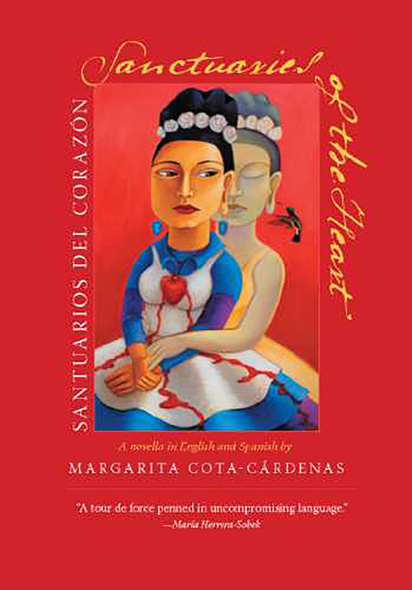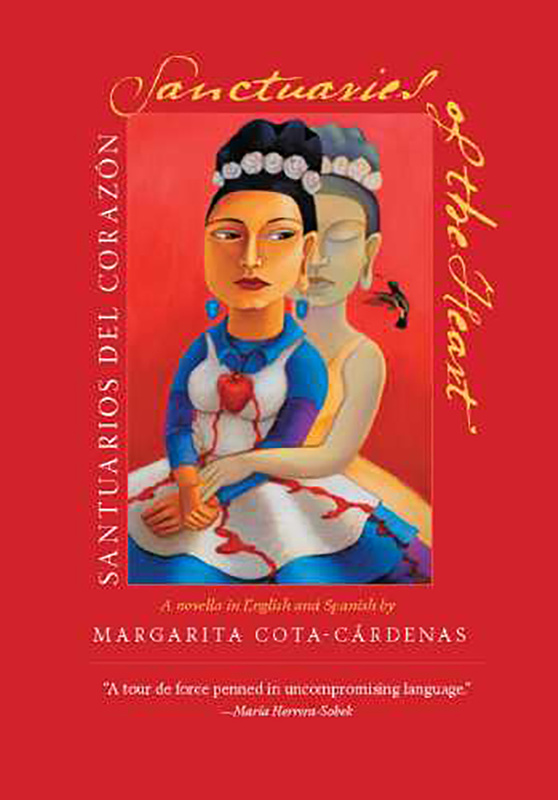Our shopping cart is currently down. To place an order, please contact our distributor, UTP Distribution, directly at utpbooks@utpress.utoronto.ca.
Sanctuaries of the Heart / Santuarios del Corazón
A novella in English and Spanish
The University of Arizona Press
The night that my father burned his house down, well, I was just beginning to gather newspaper clippings and notes for my novel. . . .
Petra Leyva has begun to write a novel about the Sanctuary Movement when she hears that her widowed, womanizing father has set fire to his house in a drunken rage. Overwhelmed by family memories, Petra begins a journey of introspection that leads her to explore what "sanctuary" really means to present-day Chicanas. Petra learns there are various types of sanctuaries—not only those aiding Central America refugees but also less obvious safe havens for the weak, the ill, the elderly, the poor. Universities are sanctuaries to which the young can flee in search of a better life. There are psychological sanctuaries where victims of sexual abuse or other forms of injustice can find relief from their private anguish. And as Petra discovers, writing itself is a form of sanctuary.
By depicting the strength of Petra and other Chicanas, Margarita Cota-Cárdenas addresses the complexities of life in an important period of time for the development of Chicana/o consciousness. As her characters grapple with issues of family, abuse, and loss, they combine the traits of saints and devils, heroes and villains to show that the representation of life is as complex as life itself. Sanctuaries of the Heart is a rich mosaic in which narrative techniques mimic the act of remembrance, a confluence of streams of consciousness that challenges canons of language and form.
Petra Leyva has begun to write a novel about the Sanctuary Movement when she hears that her widowed, womanizing father has set fire to his house in a drunken rage. Overwhelmed by family memories, Petra begins a journey of introspection that leads her to explore what "sanctuary" really means to present-day Chicanas. Petra learns there are various types of sanctuaries—not only those aiding Central America refugees but also less obvious safe havens for the weak, the ill, the elderly, the poor. Universities are sanctuaries to which the young can flee in search of a better life. There are psychological sanctuaries where victims of sexual abuse or other forms of injustice can find relief from their private anguish. And as Petra discovers, writing itself is a form of sanctuary.
By depicting the strength of Petra and other Chicanas, Margarita Cota-Cárdenas addresses the complexities of life in an important period of time for the development of Chicana/o consciousness. As her characters grapple with issues of family, abuse, and loss, they combine the traits of saints and devils, heroes and villains to show that the representation of life is as complex as life itself. Sanctuaries of the Heart is a rich mosaic in which narrative techniques mimic the act of remembrance, a confluence of streams of consciousness that challenges canons of language and form.
Such an empowering conclusion is definitely worth the challenging read’ —El Paso Times
‘Petra Leyva’s fluid prose narrative captures the flavor of the borderlands.’ —Multicultural Review
‘A captivating novella…that blends stream of consciousness with sharply carved narrative descriptions.’ —ASU Magazine
Margarita Cota-Cárdenas is the author of Puppet, which also features the character Petra Leyva, and Marchitas De Mayo. She is Professor Emerita of Spanish at Arizona State University.
by Tey Diana Rebolledo
Part One
Death Is Not My Business
Part Two
Memories and Secrets: The Taboo Stories
Part Three
Sanctuary and Resolution
Santuarios del Corazón






